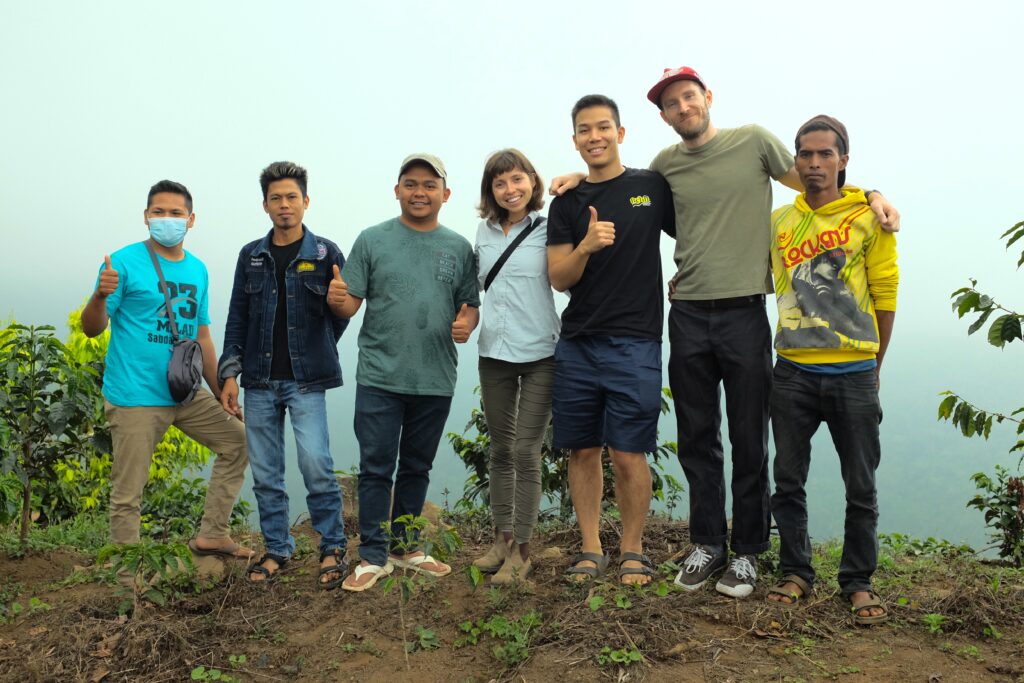East Java Welcomes Beau for a Picturesque Journey
-
Mercanta Singapore’s Beau Badinski recalls his time in East Java with Belift, our exporting partners. (All photos taken by Beau.)
As fresh concrete highways turn to dusty, vibrant, rice paddy towns, the roads littered with potholes and cracks, we make the 6-hour journey from Surabaya Central to the family home of Pak Muhlisin. This time I’m travelling with Mercanta’s traceability extraordinaire, Michaela Tomchek, and two thirds of Belift Coffee; a green coffee export team based out of Surabaya, Java. Friends and partners of us here at Mercanta, Belift are a group of young coffee professionals shining the spotlight on Javanese coffee producers, with the goal of challenging the way the world sees Indonesian coffee.
-
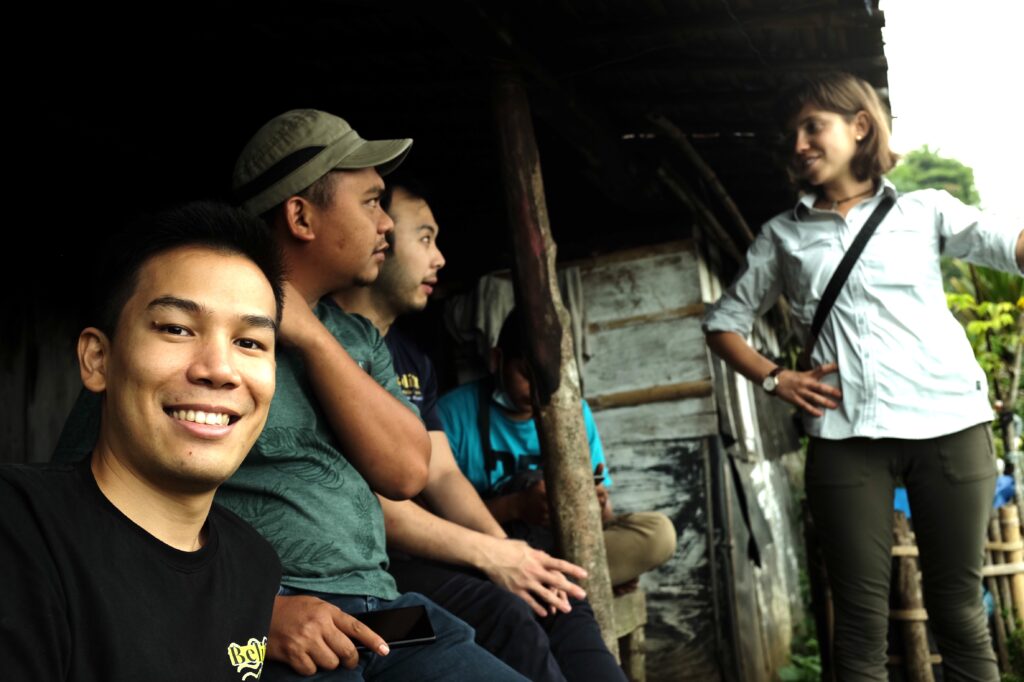
-
Ivan Hartanto and Kenny Soewondo (in the car right now), and Kevin Soewondo (not in the car at the moment but kindly picked up Michaela and I from the airport) are the masterminds behind Belift. They also turn out to be top guys, wonderful hosts and excellent car travel companions— a good thing on this sort of trip where farms are spread out and roads typically don’t go directly over mountains, meaning that what might be an 30 minutes as the crow flies becomes a meandering transit of closer to 5.
Pak Muhlisin welcomes us into his home with a warm smile, conversation, a table of food (tempeh, tofu, rice, beans, veggies, and a heavenly gado-gado style peanut sauce— because I thought you might be curious), and a cup of one of his latest experiments; a 160-hour Carbonic Macerated coffee from his co-op here at the foothills of Mount Argopuro in East Java.
-
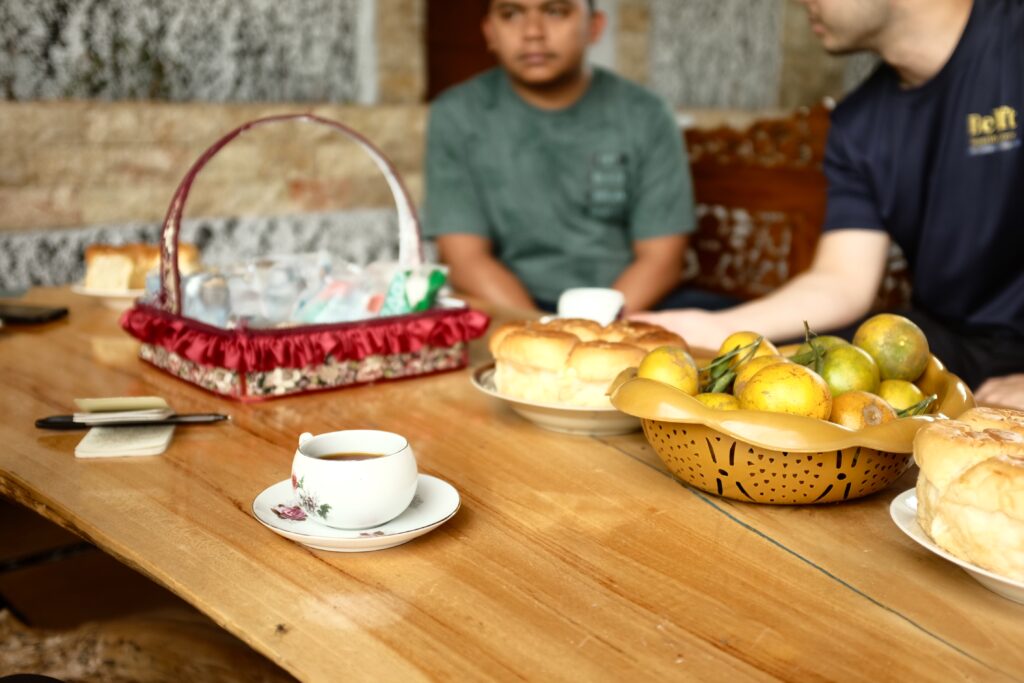
-
In a delicate floral teacup and saucer, he serves us the kind of coffee he likes to drink. Tells us about his preference for clean, bright and fruit driven coffees over the classic wet hulled coffees that Indonesia is typically known. After many rapid-fire questions regarding the co-operative that Muhlisin heads, his coffees, and his history in coffee, he leads us through a door and points out a couple dozen Grainpro bags filled with dried and hulled coffee, sitting atop a platform of pallets. These are all experiments. Coffee that has been processed at various stages of carbonic maceration. He and his team run these tests, as well as their usual lactic, anaerobic, honey and naturally processed coffees at the facility right next to Muhlisin’s beautiful, modern Javanese home.
-
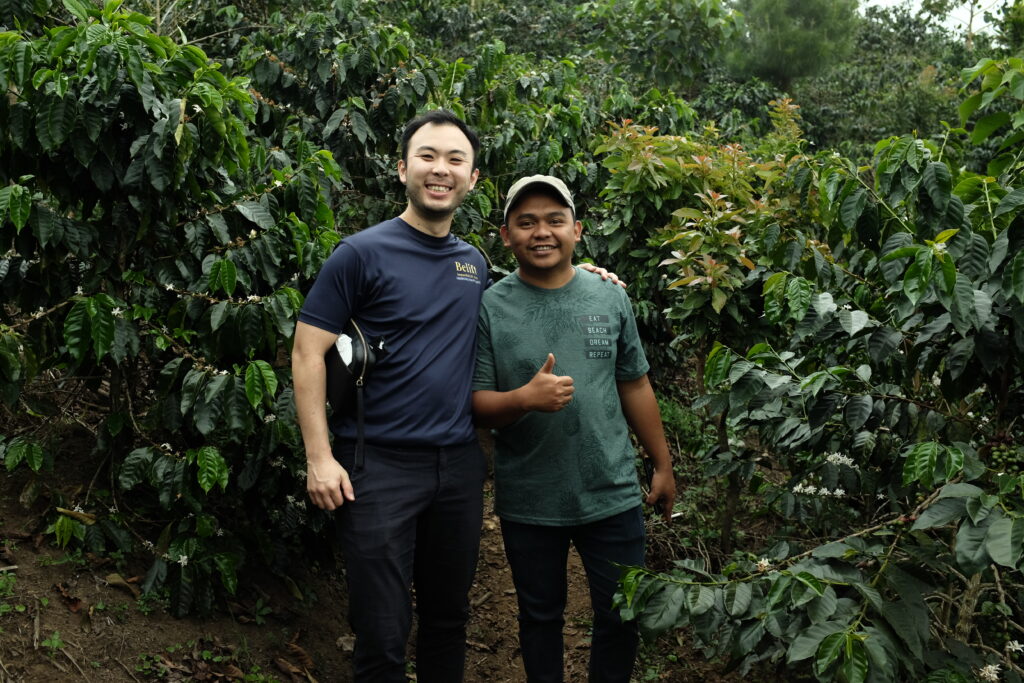
-
Muhlisin and the team run these experiments in micro batches, not much more than a couple of kilos at first, only choosing the best lots to move to production. The coffee we had moments before, a batch processed over 160 hours, Muhlisin tells us, cupped better than the 120 and 140-hour batches. With notes of cranberry, mango, crisp green apple and juicy lime, I can see how this batch earned its way as a production lot.
As we exit the facility, five stripped down scooters pull up outside the building, each with a member of the Argopuro Co-op at the bars. We are motioned to jump on the back, a lift up to the farm which is located further up the mountain. Without helmets but with full company sponsored emergency medical coverage (we do have that, right Mercanta?), the Belift boys, Michaela and I each jump on the back of a bike, though the stretched-out village along the main and only road, headed for Muhlisin’s coffee farm. The concrete turns to cobble and stone, quickly becoming a steep, narrow downhill mountain bike course as each bike shreds up the hill without issue. I later find out that these guys, all of whom have their own plot of land on which they grow coffee, frequent this route often, routinely with a couple of hundred kilos of coffee cherry on the back.
-
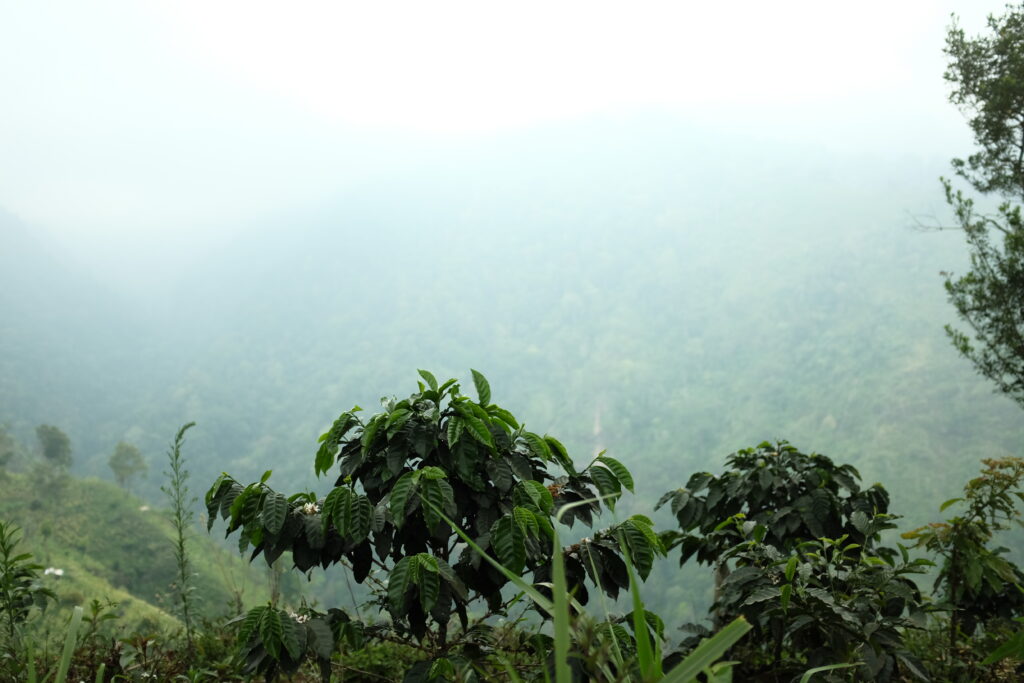
-
The land that Muhlisin’s coffee grows on, does, and always will, belong to the government of Indonesia. The land is leased by the Agricultural Department on a 35-year basis and comes with certain rules, one of which makes it illegal to cut down any native tree growing on the land. Any breach of this rule is punishable by prison time, Muhlisin mentions. So, as we walk through the farm, scattered among the lush, deep green coffee trees, are hundreds of different species of native trees, ferns and other vegetation, making it feel closer to a forest than a coffee plantation.
-
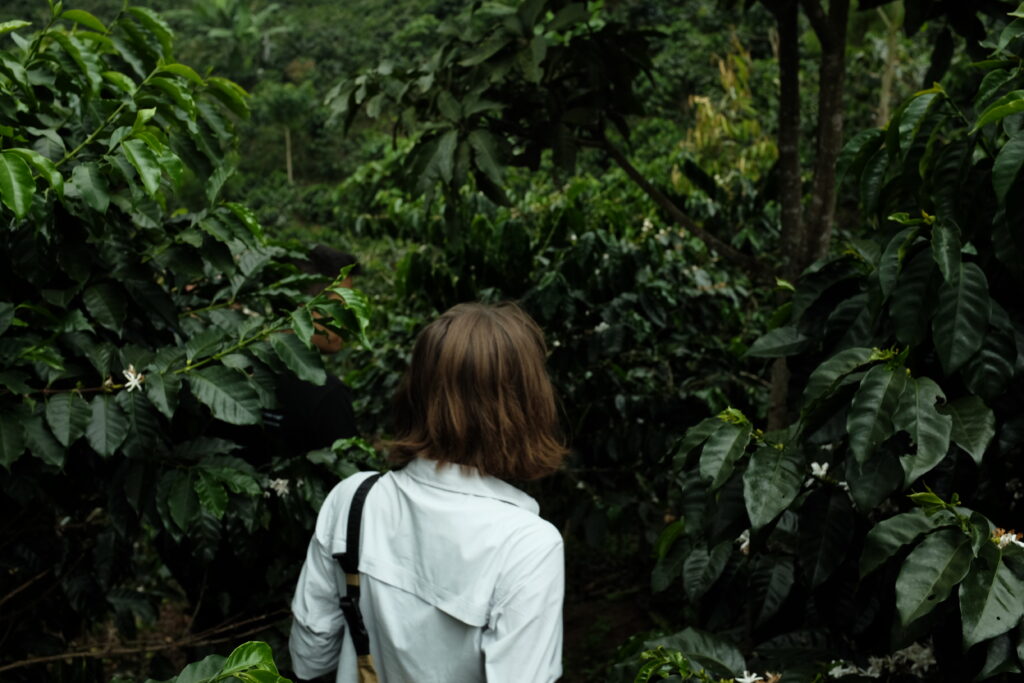
-
At around 1500 meters above sea level, we are currently at one of the lower altitude areas of the farm— the trail gets sketchier and goes on for about another hour up the mountain, revealing more coffee trees. Where we stand the air is cool and moist with the sweet smell of jasmine— a result of the coffee trees flowers. Arriving in Java after the harvest is complete, there are only a few sporadic red, ripe coffee cherries left on the trees. Late bloomers, slow to mature. Replacing the harvested cherries, however, are delicate white flowers that are incredibly aromatic. These beautiful white flowers give these coffee producers a good look into the next harvest— the more flowering, the more coffee cherries that can grow from these flowers.
-
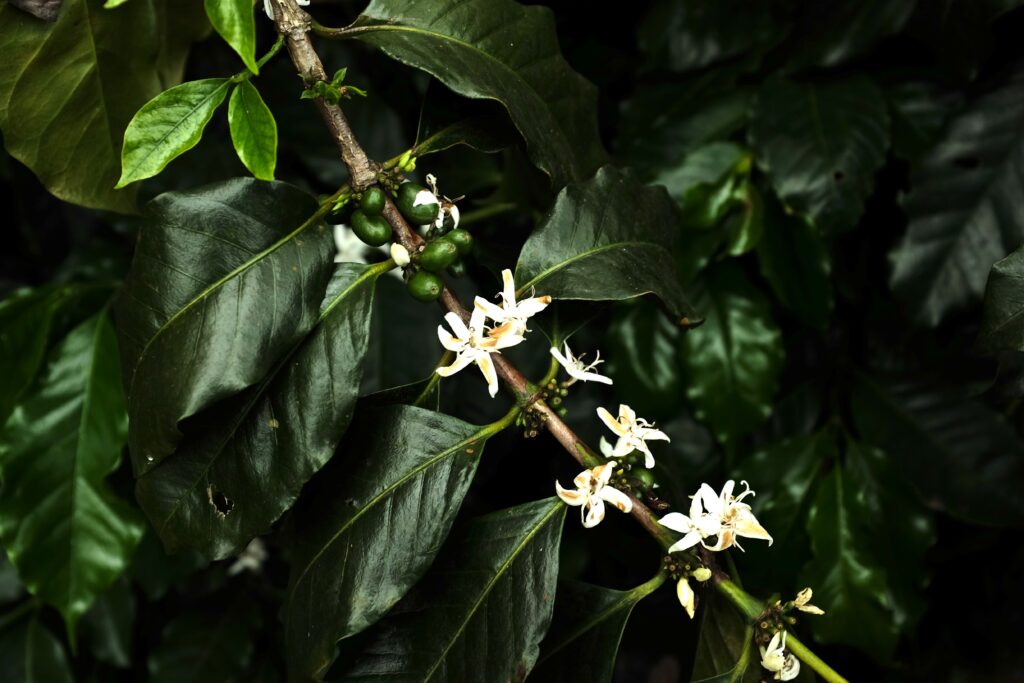
-
Next on our glorious coffee journey through Indonesia we meet Echwan— a young coffee producer in Bondowoso, East Java. Delicious honey processed lots, generously home cooked food, those taco shaped taro crackers that I love, and more car miles— coming up in Pt. 2.
-
